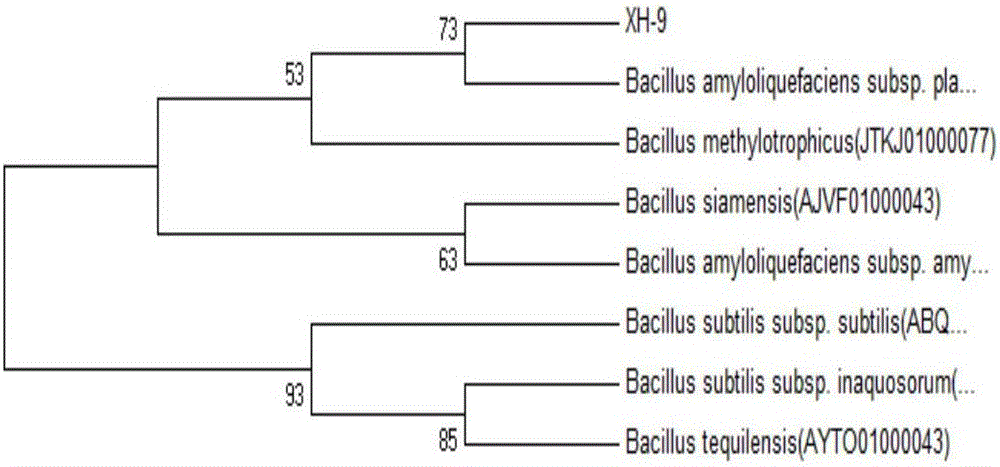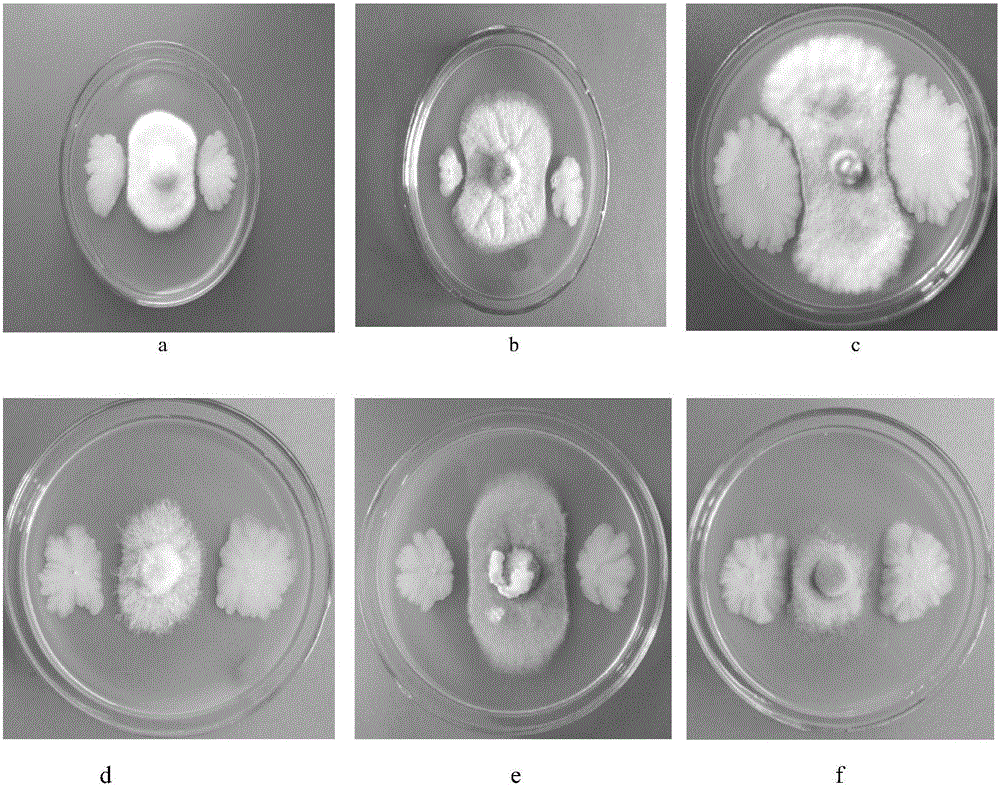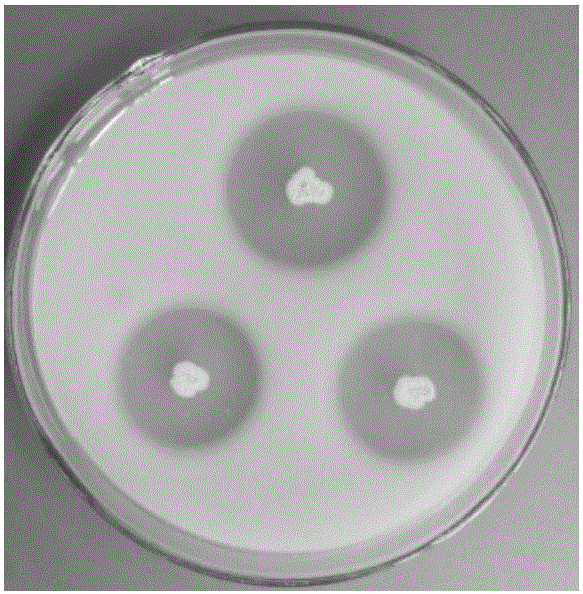Application and preparation of bacillus amyloliquefaciens subsp. plantarum and bacterial agent thereof
A technology for dissolving starch spores and bacillus plants, applied in the field of agricultural microorganisms, can solve the problems of lack of resistant varieties, increased pathogen resistance, pollution of the environment, etc., and achieves the effects of being beneficial to industrial production, promoting crop growth and simple production process
- Summary
- Abstract
- Description
- Claims
- Application Information
AI Technical Summary
Problems solved by technology
Method used
Image
Examples
Embodiment 1
[0039] 1. Isolation of XH-9 strain
[0040] Take soil samples from the wheat rhizosphere of the Hanjiazhai wheat field in Fangcun Town, Tai'an City, Shandong Province. Under sterile conditions, take 10g of the soil samples, dissolve them in 90mL of sterile distilled water, 220r / min, vibrate for 30min, absorb 1mL and mix with 9mL of sterile water. Evenly, get 10 -1 diluent, then take 1mL 10 -1 The diluted solution was mixed with 9mL sterile water to obtain 10 -2 Dilutions, indistinctly, to prepare 10 -3 , 10 -4 ,1 0-5 , 10 -6 , 10 -7 Wait for a series of dilutions. The chosen dilution is 10 -5 、10 -6 、10 -7 Use a pipette to draw 100uL of the soil dilution solution in the center of the PDA medium plate, spread the dilution solution evenly with a spreader, and incubate at a constant temperature of 30-32°C for 1-3 days. Pick a single colony, streak it into a pure culture, and save it. The PDA medium components are: 200g potato, 5.0g beef extract, 20g glucose, 15g agar,...
Embodiment 2
[0055] Determination of Bacterial Inhibition Spectrum of XH-9 Strain
[0056] Use an inoculation loop to pick a ring of purified bacteria, and point it at the two ends of the PDA plate at a distance of 3cm, and use Fusarium oxysporum, Colloid anthracnose, Alternaria, Helminthes solani, Helminthes graminearum Fusarium, Fusarium pseudograminee, P. poplar canker and Corinococcus botrytis are 8 kinds of pathogenic fungi as the targets. Use a puncher to cut out a 5mm-diameter fungus plate and inoculate it in the center of the PDA plate, and culture it at 28°C for 2-3 days , the test results show that the XH-9 strain has a good antagonistic effect on 6 strains of pathogenic fungi such as Fusarium oxysporum, colloid anthracnose, Fusarium graminearum, and Alternaria. The test results are shown in Table 2. XH-9 The antagonistic spectrum of the strains is shown in the appendix figure 2 .
[0057] Table 2 The relative bacteriostatic rate of XH-9 strains to various pathogenic fungi
...
Embodiment 3
[0060] 1. Determination of the colonization ability of the XH-9 strain in the rhizosphere of wheat, pepper and corn
[0061] (1) Double antibiotic screening and stability detection of XH-9 strain
[0062] Scrape the lawn of XH-9 strain cultivated on 2 ring plates and inoculate it into LB liquid medium without rifampicin, cultivate at 30-32°C, 200-220r / m for 24h, and use it as seed solution. The seed solution was inoculated into the LB liquid medium containing 5 μg / mL rifampicin (Rif) with an inoculation amount of 2% (volume ratio), and the shake flask was cultivated for 24h; Inoculated in LB liquid medium containing 10 μg / mL rifampicin, and cultured on a shaking table for 24 hours; and so on, so that the concentration of rifampicin gradually changed from 5 μg / mL, 10 μg / mL, 20 μg / mL, 40 μg / mL, 80 μg / mL, 150 μg / mL until it increased to 300 μg / mL, the strains resistant to rifampicin were obtained by culture. Inoculate the obtained anti-rifampicin strain into the LB liquid medi...
PUM
 Login to View More
Login to View More Abstract
Description
Claims
Application Information
 Login to View More
Login to View More - R&D
- Intellectual Property
- Life Sciences
- Materials
- Tech Scout
- Unparalleled Data Quality
- Higher Quality Content
- 60% Fewer Hallucinations
Browse by: Latest US Patents, China's latest patents, Technical Efficacy Thesaurus, Application Domain, Technology Topic, Popular Technical Reports.
© 2025 PatSnap. All rights reserved.Legal|Privacy policy|Modern Slavery Act Transparency Statement|Sitemap|About US| Contact US: help@patsnap.com



